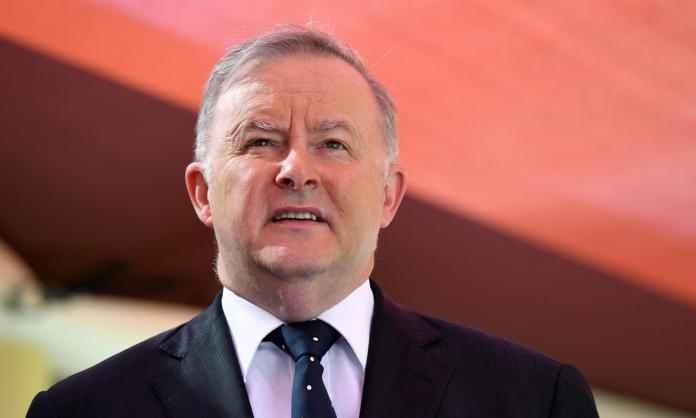With a federal election possible later this year, alarm bells are sounding in the ALP. There is growing concern that Labor is set for a hiding and that the Coalition will chalk up a fourth straight election victory.
On the raw numbers, the panic seems unnecessary. Opinion polling shows the party winning 48-49 percent two party preferred support, within reach of defeating Morrison. The government needs to lose only two seats to forfeit its majority, and Labor held on to Eden-Monaro in July last year in the only by-election to date. But there is nevertheless an undeniable sense that Labor is heading for a trouncing: there is simply no enthusiasm for the party.
Things were very different last January, when Morrison was holidaying in Hawaii as the nation burned. The prime minister’s callous indifference to the bushfire crisis confirmed in the public mind that he didn't give a damn about the lives of ordinary people. He became a hate figure, and his approval rating fell to just 37 percent, well below Albanese’s 43 percent.
But very quickly during the COVID-19 crisis, Morrison’s approval rating soared to 68 percent, the sharpest turnaround in the history of polling. Morrison now far out-polls Albanese as preferred prime minister.
Albanese complains that Labor has found it difficult to lay a hand on the Morrison government because the COVID-19 crisis supposedly “sucked the politics” out of 2020. The nation, supposedly, rallied around the national leader who brought everyone together to deal with the COVID-19 threat.
But Morrison's ability to cast himself as “national leader” is in large part Labor’s responsibility. From the outset of the COVID-19 crisis, Albanese and his colleagues have gone out of their way to “put politics aside” and support the government in this time of national crisis.
The Labor state premiers, including the supposedly socialist Daniel Andrews, joined Morrison's national cabinet and trumpeted the idea that a new period of cooperation across the parties had begun. Even though Albanese is not included in the National Cabinet, federal Labor abandoned its role as an opposition and instead gave the government an easy ride. The ACTU too jumped on board the national unity train, holding regular meetings with government ministers and bosses to discuss industrial relations “reform”.
At every stage, Labor has been more concerned to present itself as a responsible partner with the Morrison government than as a force holding it to account or fighting for the best interests of workers and the poor.
The party also missed numerous opportunities to lay a glove on Morrison last year. There was the government’s initial botched handling of the COVID-19 crisis, when it dragged its feet in the face of looming disaster. There was its attempt to wriggle out of its responsibility for hotel quarantine or aged care, and its disastrous handling of the Ruby Princess cruise ship when it docked in Sydney. Then there were Morrison’s constant attempts to sabotage the Queensland and Western Australia border closures or the Victorian government’s strict COVID-19 measures during the second wave, while at the same time praising New South Wales premier Gladys Berejiklian’s inconsistent and haphazard response, which at any moment could have led to a serious outbreak.
The Morrison government’s handling of the COVID-19 crisis has been underpinned by its desire to put the interests of business ahead of public health. That’s what the conservative mantras “balancing health and the economy” and “learning to live with the virus” are all about: let business open up even though this aids the spread of the virus; accept a certain number of entirely avoidable deaths just to keep hospitality and commercial real estate functioning.
But where has federal Labor been? Rather than mount a serious fight exposing the Morrison government’s sluggish and half-hearted response to the biggest threat to public health for a century, Albanese and colleagues were mealy-mouthed in their opposition, at best.
And when it came to measures such as doubling the dole, a policy that might once have been associated with Labor governments, Albanese could only complain about the impact on the budget bottom line. Labor’s criticism of the JobKeeper scheme was likewise that some workers would be receiving more than their usual wage.
Labor was not so concerned about the budget bottom line when it came to Josh Frydenberg’s income tax cuts in the November budget, which will over coming years overwhelmingly benefit the middle class. Labor said it opposed them but then waved them through in parliament. All in the name of “good governance”.
Why was Labor not on the front foot all of last year exposing the government’s prioritising of big business profits over public health? Why did it not at least vote against the tax cuts for the better off? Why did it not denounce Morrison’s attacks on the states imposing border closures? Why did it not respond to the spending measures by saying they were inadequate and skewed towards protecting the bosses and put forward its own COVID-19 plan? A plan that would permanently elevate dole payments, crack down on poorly-regulated aged care homes and expand public sector jobs—things that would help the working class, not just for six months, but indefinitely.
It’s not like it didn’t have the political space to put forward a much more ambitious program to protect working-class living standards. Morrison’s approval rating soared last autumn in large part because of the government’s measures that protected people from the worst effects of the economic downturn. And in recent months, the IMF, OECD and World Bank have all been urging governments to loosen the purse strings and spend whatever it takes to get out of the crisis.
Labor’s tagging along behind the government, its refusal to attack Morrison’s putting profits ahead of public health, should not really surprise anyone familiar with the party’s history. When push comes to shove, Labor has always governed in the interests of the bosses. That is the record of every Labor government. Even in opposition, Labor never demands fundamental reforms that would challenge the bosses.
Since losing the 2019 federal election under Bill Shorten, the party has abandoned its brief flirtation with lukewarm measures to address inequality, policies that it concluded were responsible for its loss. It went out of its way, in particular, to make even more abundantly clear its support for the fossil fuel industries and buried its interim emissions targets, only sticking by the goal of net zero emissions by 2050, something far enough away that it would never have to be addressed with any urgency.
The idea that Labor lost in 2019 because its agenda was too radical was nonsense. The problem was more that Labor took policies to the electorate that were badly put together, not explained well, did little to actually lift working class living standards and were being sold by a phoney, Bill Shorten, a notorious right-wing hack. Even in Queensland, according to an Australia Institute survey, three-quarters of Queenslanders support the phasing out of the coal industry. But the facts were irrelevant. Pinpointing Shorten’s mildly social democratic platform as the cause of Labor’s 2019 loss suited caucus members eager to return to the types of right-wing policies pursued by the party since the Hawke and Keating governments.
It would be easy to explain Labor’s support for the Morrison government’s pro-capitalist policies by the fact that the Right are dominant in the party and are driving these policies. There’s no doubt that leading Labor right-wingers are determined to reduce the space between the party and the Coalition on tax cuts and other signature Liberal policies. They are the open servants of the capitalist class, completely committed, for example, to the fossil fuel industries.
But the connections between Labor and the resources sector are deep. The problem lies not just with Joel Fitzgibbon.
The party has received more than $3 million in donations from fossil fuel companies since 2012. Far more important in explaining the ALP’s support for fossil fuels is the fact that Labor wants to form government—federally and in the states—and the resources sector is crucial to the profitability of Australian capitalism, the interests of which Labor promotes. Australia is the world’s largest exporter of coal and liquid natural gas, and these industries represent Australia’s second and third most important commodity exports, with export earnings in 2018-19 valued at a massive $120 billion.
The billions of dollars in annual profits flowing into the industry speak much louder in the Labor caucus than the politely worded reports of scientists warning about the threat of climate catastrophe.
Labor’s failures can’t be explained just by reference to the power and dominance of the right wing in the party. Albanese, the first Left faction figure to lead the party in its history is, after all, in charge. He has led the right-wing backlash against Shorten’s supposedly too social democratic 2018 election campaign. And it was Albanese who dumped Mark Butler from the Climate Change and Energy portfolio and replaced him with the Right’s Chris Bowen, who announced his priority as “jobs, jobs, jobs”, in other words boosting the big fossil fuel companies and damn the consequences for the climate.
So the leader of the party’s Left is as responsible for the current state of the party as the official Right. But where has been the resistance from the rest of the Left in the shadow cabinet? Why have Tanya Plibersek, Penny Wong, Mark Butler, Brendan O’Connor, Linda Burney, Julie Collins and Terri Butler not stood up to fight the party’s right-wing trajectory?
Obviously, there are short-term factional considerations. Openly opposing Albanese would undermine the position of the Left faction since he is one of their own. The main thing, though, is that the Labor Left shares with the Right the belief that the party must deliver for big business. Years of holding cabinet positions have driven home the belief in their ranks that Labor can govern only if it delivers for Australian capitalism (not that any of them needed much convincing on this score).
And so Labor Left figures are happy to publicly support the party’s policies on fracking, the massive subsidies to the coal industry and offshore mandatory detention of refugees. The party will not commit to rolling back the massive hikes to university fees that took effect this year nor to boosting the dole to a level that will permanently lift recipients out of poverty. Not one Left politician will sacrifice their position in the shadow cabinet to denounce these policies. Labor’s Left tries to make palatable the policies that most Labor supporters would reject out of hand if they came exclusively from the Right.
The Labor Left are steadfast supporters of Australian capitalism. When it comes to it, it really does not matter which of the current crop of Labor politicians runs the party. Whether Plibersek or Wong on the Left or Marles or Bowen on the Right, they are all committed to propping up the profits of big business. No amount of shadow cabinet reshuffles will alter this fact. It is possible Labor may win the next federal election, but they have already demonstrated that we should expect nothing from them. We need to rebuild a socialist left in this country that puts working-class interests first, not those of the bosses.









